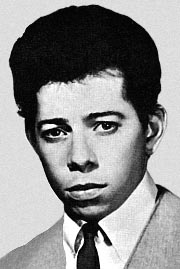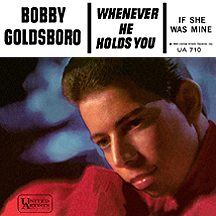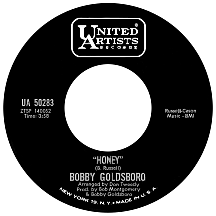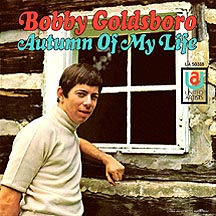BOBBY GOLDSBORO
Bobby Goldsboro was having a nice run of hits in the mid-'60s when suddenly, with the release of a song called "Honey" in 1968, he became a major star. In one fell swoop, he was in hot demand. Johnny Carson wanted him on The Tonight Show. Music fans were clamoring for the single and album that featured this emotion-filled song about a man in love with his wife, who planted a tree with her and watched it grow, surprised her with a puppy at Christmastime, then came home one day to find she had died. Perhaps the timing was right, although the record would likely have connected with the public at any time, but either way it was one of the biggest hits of the decade and has overshadowed everything he did before or since. Looking through the eye-blurring tears at the rest of Goldsboro's career, one realizes how versatile he really was.
He was born in Marianna, Florida (a few miles from the Alabama border) and lived there until the mid-'50s when his family moved north to Dothan, Alabama (a few miles from the Florida border). Bobby's love of baseball (and dream of someday playing second base for the Cleveland Indians) was set aside when he took up guitar playing in high school and started a band called The Webs with three of his friends. During 12th grade, in 1958, he and the guys performed at an air base for ten bucks apiece and were hooked. Once they made a little more money, the group bought matching outfits to fit the image: black shirts, black pants and white ties with a black spider on them, and they all wore fashionable Buddy Holly-style horn-rimmed glasses. To top it off, there was a big black spider logo on the drum kit.
Goldsboro's bandmates were guitarist John Rainey Adkins, bassist Amos Tyndall and drummer Paul Garrison. When Bobby enrolled at Auburn University (about 120 miles north of Dothan), the other three joined him and the group played steady weekend gigs in the area for the next two years. The desire to make a record got to be very strong, so they auditioned for Heart Records, a small label based in Birmingham (another hundred miles to the north). "Dizzy Boy," a song Bobby wrote, was recorded soon after. It became a pretty big hit, too...in Dothan, that is, where everyone knew the band. There was a second single, "Lost (Cricket in My Ear)," which picked up a little regional airplay, enough for the record's sales to go into four figures. "Lost" was an odd one about being stranded in the woods, featuring appropriate sound effects, including cricket sounds supplied by Rainey and a frog voice Goldsboro would continue to use, at inopportune times, for many years.
This limited brush with popularity had a silver lining. Roy Orbison came through the area on tour in 1961 and the Webs opened for one of his shows. Orbison was impressed with the group's musicianship (the two years of experience in northern Alabama had sharpened their skills considerably) and when he later fired his entire touring band (over behavior that may have been alcohol-related) he called and asked them if they'd like to join him on the road. Jumping at the chance, they became The Candymen (after Roy's recent hit "Candy Man"), continuing as The Webs for their own shows.
Great opportunity that it was, working with Orbison didn't exactly put them on easy street. Roy's career was at its peak between 1961 and '64; he would fly to each scheduled city while the four band members drove a 1955 Chevy, renting U-Haul trucks to carry their equipment. The exposure opened doors for Goldsboro; New York-based producer Jack Gold approached him about making some records, and his first solo effort was released on the Laurie label in December 1962. "Molly," written by Steve Karliski, was about a soldier who returns from the war, blinded, to be with his wife and child. Bobby wasn't fond of the tearjerker, but it made a respectable showing on the charts. He would, of course, later return to the subject of tragedy with much greater impact.
He became close friends with Orbison during the two-and-a-half years they worked together. They were of like mind when it came to songwriting; Bobby recorded one of their collaborations, "The Runaround," as a follow-up Laurie single. Another Orbison-Goldsboro effort, "Baby's Gone," was a minor hit in late 1963 for Gene Thomas. They wanted to continue writing together, but Wesley Rose of Orbison's publishers, Acuff-Rose, stepped in with an unreasonable demand: his company would receive all of the royalty money. Bobby's publishers were willing to split the profits 50/50, but Rose was notoriously hardheaded and wouldn't agree. The potential hit writing team was broken up, to the dismay of Roy and Bobby.
Jack Gold took a position as head of A&R at United Artists Records in 1963 and signed Goldsboro to a contract. UA gave him more freedom to write and record his own songs and the new deal was immediately fruitful: "See the Funny Little Clown" was a hit in March 1964, squeezing into the top ten just as The Beatles were taking over the American charts. Bobby hesitated to leave Orbison, but Roy gave his blessing, saying he could come back anytime and play guitar for him. "Whenever He Holds You," another Goldsboro original, hit the top 40 in May, followed by the Burt Bacharach-Hal David song "Me Japanese Boy I Love You," which didn't fare as well. Bobby wasn't all that comfortable recording in New York, preferring the looser southern atmosphere to the stricter union musicians he found himself working with in the big city. By the end of the year he was doing all of his sessions in Nashville.

Goldsboro had a knack for delivering a tender ballad, but after the fourth United Artists single fell short of the charts, he was ready to pick up the tempo. "Little Things" hit big in early 1965, featuring harmony vocals by Ray Stevens, often found hanging out at recording studios in Nashville, whether making his own music or sitting in with others. Perhaps as a result of the Nashville surroundings, "Voodoo Woman" was Goldsboro's first hit with a country-rock feel, a style he would lean closer to some years later. "If You've Got a Heart" and "It's Too Late" were other uptempo mid-'60s hits. "Broomstick Cowboy" caused a minor controversy in '65 (the year "protest" songs became the hot trend with folk-rockers like Bob Dylan and Barry McGuire). Its lyrics told a story of a young boy who would grow to be a man, but the line 'one day you'll have to learn to hate, you'll have to learn to kill,' when taken out of context, made programmers nervous and the record met with resistance.
Bobby displayed great range in his songwriting during those years. He wrote all of his hits between 1965 and 1967 and began taking more control in the studio, co-producing most of the sessions with Bob Montgomery. Then came "Honey," which had been composed by Bobby Russell and first released by Bob Shane of the recently disbanded Kingston Trio. After the original stalled, Bobby's version came out and took off quickly, spending five weeks at number one in April and May 1968, hitting the top of the country charts as well. An appearance on The Mike Douglas Show at about that time would lead to a new career path. Bobby's personality clicked with Mike's and he was invited back to co-host the show for an entire week (a trademark of Douglas's shows, the most fondly remembered being the week John Lennon and Yoko Ono co-hosted in February 1972). Appearing dozens of times over the next few years, he began to get the hang of the talk and variety show game.
"Autumn of My Life" and ""I'm a Drifter" were self-penned late-'60s hits, and Sonny Curtis (of The Crickets) contributed "The Straight Life." Bobby's thoughts on relationship break-ups was the subject of "With Pen in Hand," considered by many to be his greatest achievement. Billy Vera had a hit with it in 1968 and a particularly emotional rendition by Vikki Carr was even bigger in '69; Bobby put out his own version in 1972. The previous year, the Mac Davis song "Watching Scotty Grow" had been another sentimental career highlight, and big hit, for Goldsboro.
The numerous appearances with Mike Douglas readied him for the next career phase, hosting his own variety series. The Bobby Goldsboro Show pulled in high ratings in syndication from 1973 to 1975. With a wide range of guests, the show also featured comedy bits with a frog-puppet character based on the voice Bobby had annoyed people with since he was a kid (on Roy Orbison's tour of England in May and June 1963, Bobby baffled The Beatles with his frog sounds, and before long Paul McCartney was imitating them). In late 1973, while the TV show was at its peak, Bobby released "Summer (The First Time)," about a young man's first sexual encounter (a la Summer of '42). Once again he felt the ban on radio play due to what some programmers considered suggestive lyrics. The song was a hit anyway. In the 1980s he took to writing music for television and, among other projects, composed the music for the early-'90s Burt Reynolds sitcom Evening Shade.
NOTABLE SINGLES:
- Dizzy Boy - 1961
by the Webs - Lost (Cricket in My Ear) - 1962
by the Webs - Molly - 1962
- See the Funny Little Clown - 1964
- Whenever He Holds You - 1964
- Me Japanese Boy I Love You - 1964
- I Don't Know You Anymore - 1964
- Little Things - 1965
- Voodoo Woman - 1965
- If You Wait For Love /
If You've Got a Heart - 1965 - Broomstick Cowboy - 1965
- It's Too Late - 1966
- I Know You Better Than That - 1966
- It Hurts Me - 1966
- Blue Autumn - 1967
- Goodbye to All You Women - 1967
- Honey - 1968
- Autumn of My Life - 1968
- The Straight Life - 1968
- Glad She's a Woman - 1969
- I'm a Drifter - 1969
- Muddy Mississippi Line - 1969
- Can You Feel It - 1970
- Watching Scotty Grow - 1971
- And I Love You So - 1971
- Come Back Home - 1971
- With Pen in Hand - 1972
- Summer (The First Time) - 1973
- Hello Summertime - 1974
- A Butterfly For Bucky - 1976
- Me and the Elephants - 1977




